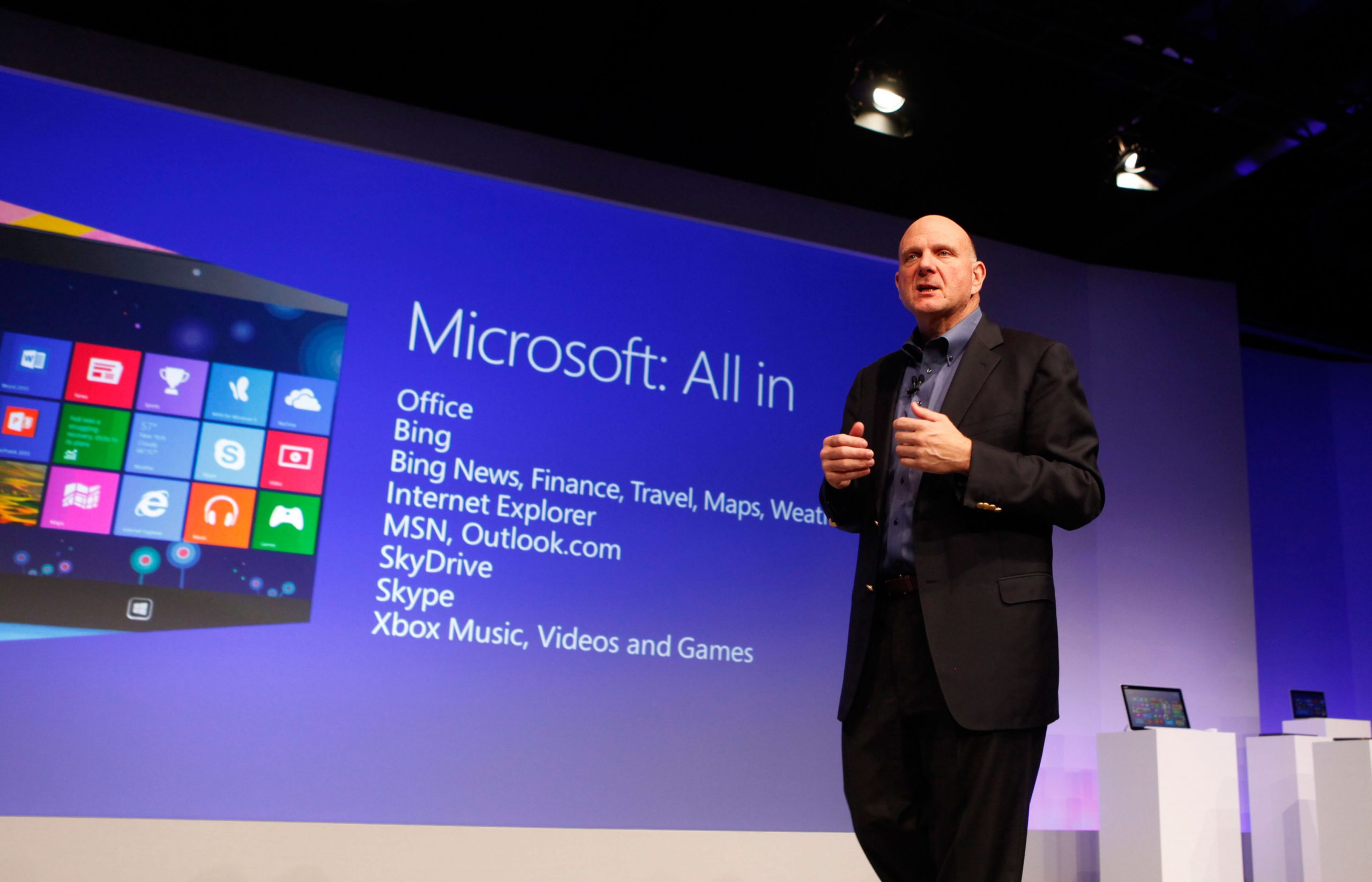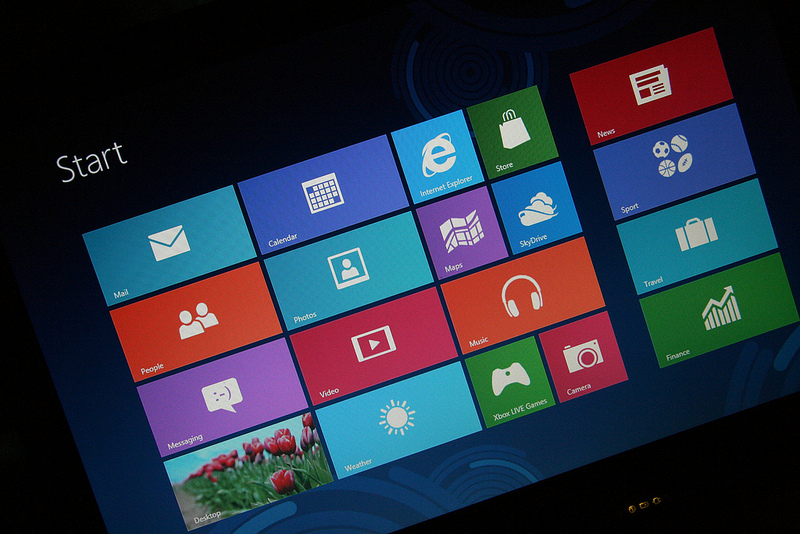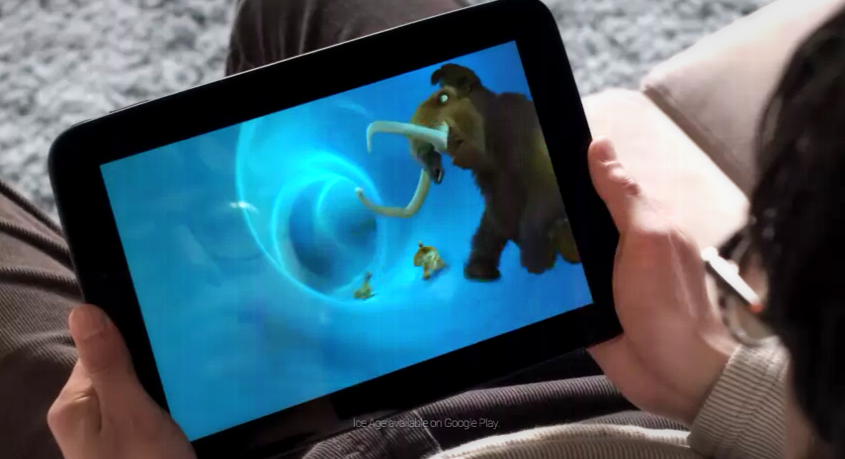
Why are Windows 8 sales so good when PC shipments are so bad?
All signs pointed to another disappointing quarter for Microsoft's Windows division. But, instead, with fiscal second-quarter results announced today, revenue rose 24 percent year over year. Meanwhile, PC shipments are down 6.4 percent during same time period, according to IDC, which doesn't seemingly reconcile with Windows OEM revenue rising 17 percent. What's up with that?
There is sense behind the numbers, which forebode potential trouble ahead the next couple quarters, unless PC shipments pick up or Microsoft hits a big home run with Surface Pro, which goes on sale February 9. Simply stated: The company got big lift by selling cheap Windows Pro upgrades, something that ends January 31. OEM increase is byproduct of PC makers stocking the shelves with new models. Neither is sustainable, raising question: Will Windows 8 be a one-hit wonder? Meaning: One quarter of sales greatness?

Microsoft brings the Live Tile experience to SkyDrive
Windows 8's new Start screen evokes many emotions from customers, with most falling on either the love or hate side with almost no middle ground. However, one thing that can be agreed on is that the screen has no shortage of information. Users are bombarded with messages from Facebook, email, weather and countless other endlessly updating tiles. Now Microsoft has added one more to the perhaps overloaded mix.
Today the company announced it is pushing an update to the SkyDrive app for Windows 8 that will bring the live tile features to the cloud storage and sharing platform.

What you need to know about Microsoft's 'New Office'
Even though Microsoft's lips have been sealed shut on the topic, launch of Office 2013 (and the new Office 365) is imminent. Speculation is fueled by the Office 2013 available on its Home Use Program (HUP) website, something which has customarily preceded most prior Office launches. If the show is about to begin, then all of these preparatory charades are quite the indicator.
Martin Brinkman provided a wonderful in-depth preview on Office 2013 this past summer, and the great majority of what he covered is still valid in the final bits. I've personally been using a MSDN copy of Office 2013 Pro Plus since about late October and am quite pleased with the product. Ever since Microsoft dabbled with x64 capability in Office 2010, in-house developers increased memory and security aspects that 64-bit provides and the result is a smoother, safer Office experience. Microsoft posted a long Technet article on the benefits of x64 Office 2013 this last summer.
Should Barack Obama stick with BlackBerry?
Barack Obama is now officially in his second term as President of the United States, following the January 20 inaugural swearing in. We have another four years of Obama, but does he have another four years of BlackBerry? He is by far the most profile Crackberry, in 2009 fighting to keep his smartphone in the face of opposition. (You think Apple losing that iPhone 4 in a bar was bad? Imagine the president leaving his handset behind.) But Obama is President and Commander-in-Chief and got to keep his Canadian gem.
But it's a new administration, and Obama appoints new cabinet members. Which of them is more important, gets more attention than his smartphone? So the question: Should he stick with BlackBerry or switch platforms?

It's easier to win the lottery than buy Google Nexus 4
The Nexus 4 was anything but a secret long before Google officially raised the curtain on October 29, last year. Impressive specs, affordable price, the promise of timely upgrades, all were compelling arguments as to why I must buy one when sales start. However, Google didn't care about my enthusiasm and had other plans in mind, offering the smartphone only to a limited number of markets. Lucky me, I'm not invited to join the party. So what can I do?
Like any passionate, but patient, enthusiast my first thought was to buy one from the German Play Store, the closest one to my location and with the lowest prices as well, instead of moving to another country or shelling out more than $500 or $600 on eBay. So I asked a colleague of mine to help me out. I would pay for the Nexus 4 and he would send it my way after receiving the package. Easier said than done, obviously, as I shortly found out that Google only accepts credit cards issued in Germany. That was Plan A, by the way. OK, but now what?

A third of all users have added a Start button and menu to Windows 8 (maybe)
Windows 8 users fall into two simple categories. There are those that miss the old way of working and don’t really care too much about the tiled Start screen, and those users who have embraced Microsoft’s new operating system and don’t understand why people are still wittering on about the Start button and menu.
The truth, however, is a large proportion of users do want the Start button and menu back, initially at least, and thanks to third party software they can fulfill that desire fairly easily. There’s no shortage of freeware solutions, ranging from my personal favorite hack, Ex7ForW8, to ViStart 8.0, and we’re now beginning to get an idea of just how popular they are.

To get ahead, Apple must leave Steve Jobs behind
Second in a series. My last column looked at Apple’s immediate challenges in the iPhone business, while this one looks at the company’s mid-to-long term prospects and how best to face them. The underlying question is whether Apple has peaked as a company, but I think the more proper way to put it is how must Apple change in order to continue to grow?
Even as some analysts are downgrading Apple based on reported cancellation of component orders, saner heads have been crunching the numbers and realized that Apple still has a heck of an iPhone business. So if you are a trader I think you can be sure Apple shares will shortly recover, making this a buying opportunity for the stock.

The PC is dying? My own customers prove just the contrary
There's an excellent debate raging on the front pages of BetaNews for the past few weeks, and it's a topic that I feel quite entrenched in. Seeing as my computer repair business FireLogic deals with customers of all types on a daily basis, I thought I should drop my own two cents in on the subject. Joe Wilcox has argued the death knell for the PC is just about here, while a few others, like Wayne Williams (and myself), dispute the notion with quite the vigor.
I think this topic deserves some definite attention because there seems to be a perception out there that the rise in mobile devices such as tablets, smartphones and the like will completely eradicate the traditional PC. It's a touchy topic for my colleagues in the computer repair industry, and something that is frequently debated on the forums of a website dedicated to "our kind" over at Technibble.com.

iPhone Mini will be evolutionary, not revolutionary
First in a series. Has Apple peaked? Yes and no. I think the company still struggles somewhat to find its path following the death of former CEO Steve Jobs. But there’s still plenty happening and room for growth in Cupertino. So let’s start a discussion about what’s really going on there. I thought this might be possible in a single column, but looking down I see that’s impossible, so expect a second forward-looking Apple column.
The catalyst for this particular column is word coming over the weekend from the Wall $treet Journal that Apple is cutting back component orders for the iPhone 5, signaling lower sales than expected. I’m not saying this story is wrong but I don’t completely buy it for a couple reasons.

IBM looks into the future: Says steampunk will be the next big thing
IBM’s Social Sentiment Index is a tool designed to aggregate and gauge public opinion from a range of social media. It crunches its way through blogs, online forums, Facebook, Twitter and other social media postings, discovers what people are talking about, and then uses the results to predict the next big trends. That is, trends with actual staying power.
And the next big thing in clothing, furnishings and accessories? Steampunk apparently.

Android developers can use the Google Nexus 10 as a testing device
If CES 2013 and other major trade shows are of any indication, a plethora of Android devices are launched on a frequent basis, sporting different display configurations. For consumers that may not mean much (aside from which device to get next), but developers have to verify if apps are rendered properly across different resolutions and pixel densities. But buying all available smartphones and tablets is not a financially-sound decision, when a Google Nexus 10 gets the job done by itself.
The Samsung-made tablet sports a large 10.1-inch display featuring a whopping 2560 by 1600 resolution and a 300 ppi density. As a result, according to Adam Powell, working as Android framework engineer at Google, the Nexus 10 can be used by app developers to test user interfaces in "pretty much all environments". The question is: "How?"

Who is Aaron Swartz?
I am not a geek, hacker or programmer but simple storyteller. Some stories are unbearable to write, such as this one -- about an amazing geek and hacker who died suddenly, sadly on January 11. The world lost someone special two days ago. As you prepared for your weekend fun, he contemplated the last moments of life before taking it. You can blame the US government, as his family does and I do. A bright star has gone dark on the Internet firmament, and we'll never know what won't be seen because of it.
I didn't know Aaron Swartz, just of him. I followed some of his accomplishments and legal woes, which surely were catalyst for his final decision. Around the InterWebs, the 26 year old is described in many ways: "programmer"; "hacker"; "activist"; "advocate". His work almost certainly touches your daily life. Swartz co-authored RSS 1.0; he helped architect Creative Commons; he was serendipitous Reddit cofounder via acquisition of his company Infogami; and he was one of the most vocal, active and successful SOPA (Stop Online Piracy Act) opponents.

232 years in the making, Ordnance Survey launches its first maps app for iOS
Shortly after Apple launched its disastrous maps app, Google’s CEO Larry Page made a comment regarding how it had taken Google seven years of hard work to get to where it’s at now. Seven years sounds like a long time, but it pales into insignificance when compared to the 232 years that British mapping agency Ordnance Survey has been making and refining its maps.
It’s rather surprising that it’s taken this long for the OS to put its work on iOS, but the agency has at last come up with an official app. OS MapFinder isn’t a straight alternative to Google Maps or Apple Maps though. Rather, as Ordnance Survey puts it, the app is "aimed at walkers, ramblers, runners, cyclists and generally anyone looking to enjoy the outdoors".

5 weirdest tech products unveiled at CES 2013
Four days ago I reported about "5 CES 2013 pre-show announcements you should know about". As the show leads towards a (long awaited) finale, let's take a look at the five weird pieces of tech unveiled since Sunday.
Some serve as part of the "What were they thinking?" lesson in announcing new products, while others are good examples of tech gone too far. Since quantifying which one's more out of place than the other, the following five products will be listed in a non-particular order. Feel free to name the weirdest of all in the comments below. Be advised, that's no easy task to undertake!

4.4 million Nokia Lumia sales is not impressive at all
Windows Phone 8 is not the cure for Nokia's woes. Today the Finnish phone manufacturer released preliminary financial results for fourth quarter, managing to move just 4.4 million Lumia units.
Nokia, however, remains optimistic when it comes to sales that, at least theoretically judging by timing and product releases, should be much, much higher compared to actual preliminary numbers. The company states that "Devices & Services has exceeded expectations and achieved underlying profitability in the fourth quarter 2012", but fact is the most popular smartphone series comprises of Asha devices with 9.3 million units sold, and not Lumias. Basically the cheaper and more modest smartphones drive the "exceeded expectations" and "underlying profitability" at a first raw glance.
